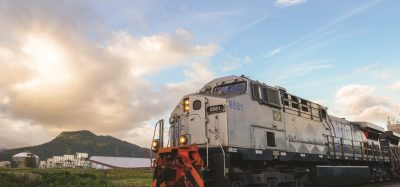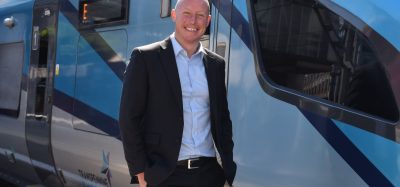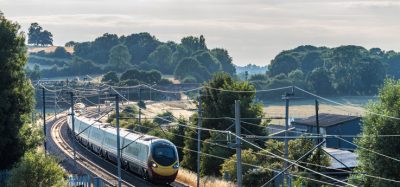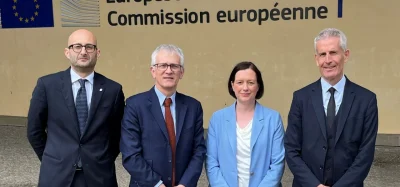Women Inspiring Rail: Q&A with Monique van Wortel, Shift2Rail
Posted: 26 September 2019 | Monique van Wortel (Shift2Rail) | No comments yet
Monique van Wortel, Seconded National Expert at Shift2Rail, explains how she has been inspired by several key industry experts during her career and how the environmental performance of the railways is something she finds incredibly important.
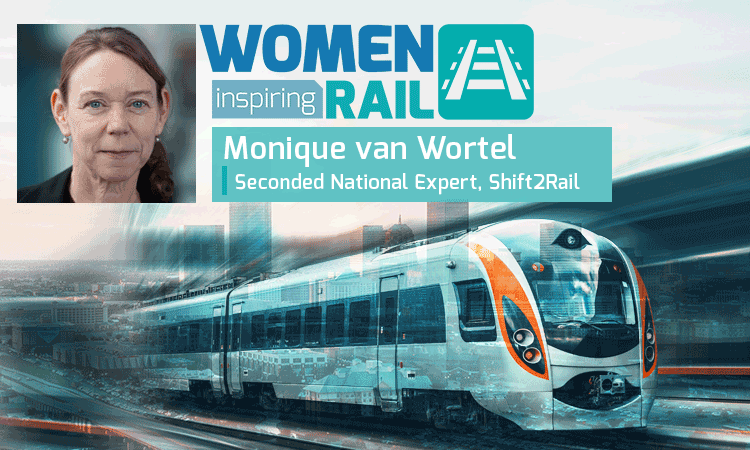

How did your career in rail begin and what does your current job involve?
My European politics, languages and economics university studies in the Netherlands helped me to enter the Dutch government in 1995 as the Ministry of Foreign Affairs. They offered a six-month intensive training course in international affairs and diplomacy to a selected group of young graduates. The training involved all kinds of international policies, e.g. economics, politics, law, trade, environment, languages and culture. The training was followed by a position at the Ministry in The Hague, and afterwards at the Dutch Embassy in Caracas/Venezuela and at the Netherlands Delegation at the OECD in Paris/France. Here I learnt the world of international diplomacy and multilateral negotiations.
Since 2002 I have specialised in international transport and environment policies and legislation at the Dutch government, the Ministry of Infrastructure and Water Management in The Hague. I was involved in the international negotiations within the United Framework Convention for Climate Change (UNFCCC) on the reduction of greenhouse gas emissions from international aviation and maritime transport. I was also involved in the EU negotiations on air quality legislation related to land transport emissions and the national mitigation measures, especially related to road transport.
In 2010 I started to work for the European Commission/DG MOVE on urban mobility policies as a Seconded National Expert. All transport modes in the urban environment were involved. I worked on the public consultation and the impact assessment on Sustainable Urban Mobility Plans for the 2013 EU Urban Mobility Package. We also organised a conference on city logistics together with the Belgium presidency of the EU.
When returning to the Netherlands in 2013, my work focused on international railway policies and legislation. I was the Dutch representative in various EU working groups and Single European Railway Area Committee on the implementation of the EU ‘Recast’ directive (2012/34/EU) of the first railway package leading to the adoption of implementing acts on e.g. licensing and framework agreements. Furthermore, I was the Dutch representative in the EU Land transport security committee involved in debates and a public consultation on the need for railway security measures in the EU. I was also the Dutch representative in various working groups and committees on international railway legislation within the International Organisation for International Carriage by Rail (OTIF). This international organisation is dedicated to international rail transport and currently has 51 member states from Europe, Asia, Middle East and Africa. For two years I was the Chair of the OTIF Administrative Committee, dealing with the administrative and financial management of the organisation.
Since 2014 I have been involved in the Shift2Rail Joint Undertaking (S2R JU), first as Dutch representative and as Vice Chair of the S2R JU States Representatives Group, and since October 2018 as Seconded National Expert at the S2R JU in Brussels. The S2R JU is a public private partnership in the rail sector, providing a platform for the rail sector to work together to driving innovation in railways and, by means of standardised technological innovations, support the realisation of the Single European Railway Area (SERA). After a market-oriented involvement in the SERA, I am now focusing more on the technical interoperability aspects.
Apart from project management, one of my current responsibilities at the S2R JU is the promotion of regional cooperation between the S2R JU and European regions that attach importance to railway research and innovation. Synergies between the current Horizon 2020 funds of the S2R JU with other EU funds on railway research and innovation could maximise the quantity and quality of investments, and thus ensure a higher impact of the funds. I am also involved in stakeholder relations to promote the results of the S2R JU entire programme through translation from a technical content to simple communication, and help growing the visibility of the S2R JU in a global context.
What aspects of your job do you find the most challenging/rewarding, and why?
The most rewarding aspect of my current job is the creation of future innovative solutions for the international railway sector to make it more competitive and technically interoperable, and help increase its market share, both for passenger and rail freight transportation.
The most rewarding aspect of my current job is the creation of future innovative solutions for the international railway sector to make it more competitive and technically interoperable, and help increase its market share, both for passenger and rail freight transportation. The S2R JU programme contributes to further digitalisation of the railway sector, e.g. by replacing manual operations by digital ones (digital break test as an example) of by developing specifications for different grades of automatic train operations. The programme also contributes to energy savings and cost reductions, e.g. by increasing the average length of freight trains to maximise transport capacity or by developing lighter freight wagon concepts with overall mass reduction. It is rewarding to try to flexibly respond to the needs of the sector; based on recent experiences and demands from the sector a new research and innovation activity will start this year on addressing language barriers for train drivers when crossing the border. In general, the most challenging part for the S2R JU will be the actual deployment of the S2R research and innovation activities in the real market. Therefore, standardisation of the results of the programme will be a key aspect, which is a topic I actively investigate and try to move forward.
What is it about the rail industry that you are most passionate about?
From an environmental point-of-view, the railway is a mode of transport with great sustainability performance making only marginal contribution to the transport sector’s overall share of greenhouse gas emissions. With a view to climate change and my earlier focus and involvement in the field of international transport and environment policies, further improvement of the environmental performance of the railways is something of importance for me. This could, for example, be realised in my current job by developing research and innovation actions to optimise the use of energy and to improve the capacity on the railway track. Furthermore, promotion of IT solutions for attractive railway services for passengers, in terms of planning, booking, ticketing and payment, could make railway transport more attractive and lead to an increased market share versus other passenger transport modes. This could improve the environmental performance of the overall transport sector. In my opinion, another important challenge that the railway sector should address – from an important environmental point-of-view – is the reduction of railway noise in densely populated areas. The S2R JU is also active on this topic and have developed new concepts for rail freight locomotives with noise reduction, or noise and vibration reduction with better prediction techniques and mitigation measures.
Another environmental performance topic that attracts my interest is the contribution of railways to the circular economy. The Dutch railway undertaking NS announced in 2019 that, when modernising their rolling stock, they aim to realise 100 per cent circular trains by reusing all the material of existing rolling stock, e.g. furniture, electronics, isolation material. I fully support this ambition and believe it is an example of good practice to follow by other railway undertakings in the EU.
What has been your biggest achievement/proudest moment so far in your rail career?
My proudest moment so far in my rail career was when I was invited by the former Secretary General of OTIF, Mr. François Davenne, to chair the 13th OTIF General Assembly in September 2018. The General Assembly took the important decision to create a new appendix to the Convention concerning International Carriage by Rail (COTIF) on the safe operation of trains, which opens the way to the expansion of interoperability beyond Europe. Another topic decided upon was the procedure regarding the election of a new Secretary General. My experience gained with international diplomacy at the Dutch Ministry of Foreign Affairs was very helpful to Chair the General Assembly, to mediate between the different viewpoints and find creative solutions acceptable to all member states for the issues at stake.
Another achievement for which I was responsible at the Dutch Ministry of Infrastructure and Water Management was the launch in the Netherlands in 2017 of a new long-range suicide prevention programme for the railways sector to improve safety and reliability of rail traffic.
Another achievement for which I was responsible at the Dutch Ministry of Infrastructure and Water Management was the launch in the Netherlands in 2017 of a new long-range suicide prevention programme for the railways sector to improve safety and reliability of rail traffic. The programme focuses on prevention measures, measures to reduce the time of operational processes to restart rail traffic, and further research and innovation activities in this field. It was personally very rewarding to work on this, as suicide is a very impactful occurrence for everyone involved.
Finally, during the Dutch presidency of the EU, I contributed to the organisation of a high-level railway freight event at the EU TEN-T days in Rotterdam in June 2016, which was a clear success. A Ministerial Declaration on Rail Freight Corridors to boost international rail freight was agreed upon and ministers will monitor the effects of the declaration in the coming years.
How has the rail industry evolved since you joined? What have been the biggest changes?
The development of digital technologies, such as big data analytics, Artificial Intelligence (AI), open data and cloud computing, will become even more important in the future development of the rail sector.
One of the biggest changes in society is the transformation brought by digital technology, which also has a big impact on railways. The development of digital technologies, such as big data analytics, Artificial Intelligence (AI), open data and cloud computing, will become even more important in the future development of the rail sector. The S2R JU contributes to the development of big data analytics in the railway field. Furthermore, data-sharing is important for new multimodal travel services that are being developed for travellers. I believe a seamless multimodal connection is important to attract more railway passengers, as people do not like lengthy and unpredictable stops when they are travelling. Easy transfers are necessary from one mode to another including the first and last mile in urban areas, with attention paid to walking and cycling. In the European Commission I worked on research and innovation activities of these non-motorised transport modes, also paying attention to the promotion of cycling and bicycle parking at stations. The huge bicycle parking facilities at Utrecht Central Station in the Netherlands are an example of good practice in this respect. For Dutch people like me, who according to my previous Commission colleagues’ was born on a bicycle, this is rewarding to promote.
I believe a seamless multimodal connection is important to attract more railway passengers, as people do not like lengthy and unpredictable stops when they are travelling.
In my opinion the set-up of the S2R JU programme is also a big change in comparison with past common practice. The S2R JU community understands the need to work together within a European research and innovation programme, in an Institutional Partnership, in order to be competitive in a global market.
Who within the rail community has been an inspiration to you, and why?
My Dutch colleague Mr. Hinne Groot, working as Coordinator of International Railway Affairs at the Dutch Ministry of Infrastructure and Water Management, has been a real source of inspiration for me. His constant ambition and passion to improve the European rail freight corridors and promote a modal shift towards rail were a big motor behind the success of the EU rail freight conference in Rotterdam in 2016. With more than 20 years of knowledge and experience in international railway affairs I learned a lot from him. I could use this in practice in the negotiations within the EU on railway legislation that I was involved in.
The former Secretary General of OTIF, Mr. François Davenne, inspired me with the development of his long-term strategies on the future of international railways beyond the EU and the role OTIF and COTIF could play in this respect. Mr. Bas Leermakers, Head of the Technical Department at OTIF, was a source of inspiration behind the development of the new appendix to the COTIF on the safe operation of trains, also very important for international railway development beyond the EU. Mrs. Magda Kopczyinska, my previous Head of Unit at the European Commission/DG MOVE, was inspiring because of her promotion activities on gender balance within the Commission.
Finally, my current Executive Director at the S2R JU, Mr. Carlo Borghini, and the Head of Research and Innovation, Mr. Giorgio Travaini, are very active and committed advocators of the S2R JU and passionate about the results that the S2R JU could bring for the future development of the railway sector within a multi modal context.
What can be done to diversify the workforce in the rail sector? What advice would you give to those thinking about pursuing a career in rail?
Overall, digitalisation will have a strong impact on the future skills needed to work in the railway sector. For example, automatic train operations will require different roles from the train driver and the traffic control centre staff. I would therefore recommend those thinking about pursuing a career in the railway sector to pay a lot of attention to their digital skills. Furthermore, the multi modal context will be very important, with railways as the backbone of mobility, so instead of a pure focus on railways, people will have to work from a broader perspective. On top of that, travellers expect mobility to be delivered as a service. Within the railway sector I believe that a pure technical focus will not be enough in the future – a client-friendly orientation is needed as well, plus the importance of digitalisation, e.g. the required collection, analysis and sharing of data.
From my own legislative experience, I know that the railway sector is a regulated one, still with existing national rules on top of the European legislation. Within public administrations the necessary legal and political skills combined with technical knowledge of the railway sector will therefore remain important. And as the recent work of OTIF shows; railway interoperability beyond the EU is very relevant. Therefore, public relations, language and communication skills are important, within and beyond the EU, as the EU railways sector operates in a global context. For women, there are multiple chances in this field.
If you would like to take part in the Women Inspiring Rail series, or would like to nominate a colleague to part, please email: Craig Waters, Editor, Global Railway Review.
Related topics
Artificial Intelligence (AI), Big Data, Digitalisation, Multimodality, The Workforce, Women in Rail




